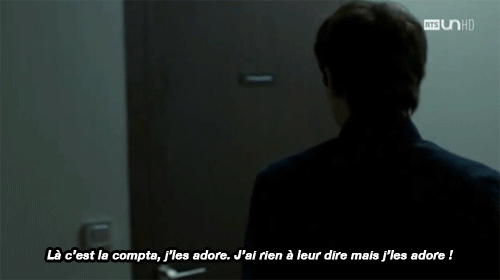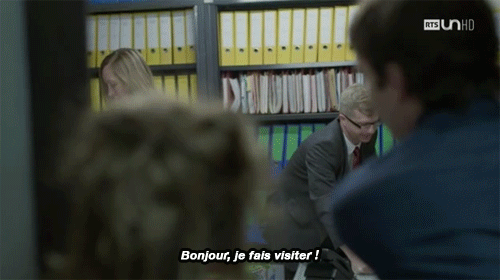Text
I usually tell my students that “close reading” means looking at what is actually on the page, reading the text itself, rather than some idea “behind the text.” It means noticing things in the writing, things in the writing that stand out. To give you some idea of what this means, I’ve made up a list of five sorts of things that a close reading might typically notice: (1) unusual vocabulary, words that surprise either because they are unfamiliar or because they seem to belong to a different context; (2) words that seem unnecessarily repeated, as if the word keeps insisting on being written; (3) images or metaphors, especially ones that are used repeatedly and are somewhat surprising given the context; (4) what is in italics or parentheses; and (5) footnotes that seem too long. This list is far from complete—in fact, no complete list is possible—but the list is meant to begin to give you an idea of what sorts of things we notice when we’re doing close reading.
What all five of my examples have in common is that they are minor elements in the text; they are not main ideas. In fact, your usual practice of reading which focuses on main ideas would dismiss them all as marginal or trivial. Another thing they have in common is that, although they are minor, they are nonetheless conspicuous, eye-catching: they are either surprising or repeated, set off from the text or too long. Close reading pays attention to elements in the text which, although marginal, are nonetheless emphatic, prominent—elements in the text which ought to be quietly subordinate to the main idea, but which textually call attention to themselves.
Most of you have been educated to ignore such elements. You have been taught to seek out and identify the main ideas, dismissing the trivial as you go. This has had to be trained into you: read to a young child sometime, you will notice she has the annoying habit of interrupting the flow of the story to draw attention to some minor thing. Close reading resembles the interruptions of that child. It is a method of undoing the training that keeps us to the straight and narrow path of main ideas. It is a way of learning not to disregard those features of the text that attract our attention, but are not principal ideas.
Jane Gallop, “The Ethics of Close Reading: Close Encounters,” Journal of Curriculum Theorizing, Vol.16, No.3 (Fall 2000), pg.7-8 (x)
5K notes
·
View notes
Text
mon journal en français - 4/30
Cher journal...
Oh, la la ! Catre jours consécutifs, est-ce un noveau record ? On verra !
Okay, allons-y ! Aujourd’hui je me suis réveillé dix minutes en retard pour me cours de “Théâtre de langue portugaise”. Le cours ce n’étaiti pas si mal, mais je suis on hâte de la semaine où les prof nous lâcheront pour lire les livres par nous-mêmes et faire l’essais, sans forcément regarder la cours synchrone. Tu peux voir que je suis très ravie pour ce trimestre. 🥱
J’ai enseigné l’après midi et mes éléves rend ma journée heurese ! Elles sont petits et très curieux (à propos de ma vie, surtout). J’aime tellment ces enfants et passer des temp avec eux me faire penser à ce que sera d’avoir mes enfants à l’avenir.
Si vous trouvez des erreurs, n'hésitez pas à me corriger, cela m'aiderait beaucoup.
17 notes
·
View notes
Note
bonjour belle! i've just recently decided to start french but i am having trouble with the alphabet (i know, i'm weak). the accents are really throwing me off -- i don't know where they go or why they're there. merci, au revoir!
hello dear (click on the titles for lists of common words containing those),
the circumflex accent : ^ (l’accent circonflexe)
#1. affects the pronunciation of a, e, and o. #2. often indicates the historical presence of a letter (commonly s) that has, over the course of linguistic evolution, become silent and disappeared. #3. less frequently, is used to distinguish homophones (ex : sur “on” / sûr-e “sure”). in certain words, the circumflex is idiopathic and has no linguistic role.
is used on the o of plural possessive words (le(s) nôtre(s), le(s) vôtre(s))
marks first and second plural persons conjugated at the past tense (nous chantâmes) + third singular person of imperfect subjunctive (qu’il vît),
is used on the i on -ître words (huître (oyster, f), épître (epistle, m),
is used of the i on -aître or -oître verbs (naître (to be born), croître (to grow) + verb plaire (to please) when -i is followed by -t,
is used on the a of the negative suffixe -âtre for adjectives, sometimes nouns : grisâtre (greyish), bellâtre (dandy, m)
the diaeresis : ¨ (le tréma)
you find it mainly over vowels e, i and u, over vowels u and y in last names or locations and over vowels a, o or u in borrowed words. #1. it indicates the necessity of pronouncing separately two graphemes instead of treating them like a couple. #2. it makes a vowel mute. #3. it symbolizes an umlaut (germanic sign). (some words don’t need one and yet their couples of vowels are pronounced separately : oui, poème (poem, m), coincer (to stuck),
é (l’accent aigu sur le e)
can mark the end of nouns. beauté (beauty, f),
marks past participles from the first group (lavé, mangé…) + be (été),
marks a word starting with -e + consonant (éveiller (to wake, v), étirement (stretching, m), émotif/ve (emotional)…),
marks an e stuck between two consonants (hébété-e (dazed) préférer (v)),
is never used before an -x (exemple, m), -f, -d (pied (foot, m)), -r, a final -z (nez (nose, m)) or a double vowel (appeler (to call, v), excellent-e),
è (l’accent grave sur le e)
can be used to make a masculine job noun feminine (a baker : un boulanger, une boulangère ; a farmer : un fermier, une fermière),
helps differenciating similar words from one another (mère (mother, f), mer (sea, f), maire (mayor, m) ; also for other letters : ou (or) / où (where), la (fem the) / là (there), à (at, prep) / a (vb avoir (to have) 3PS present)),
is used on final -s that are not a plural mark (près de (close to)),
is used before syllabes containing a mute -e (fièrement (proudly)),
is never used before an -x (sexe (sex, m), complexe (ep)…),
l’accent grave sur d’autres voyelles :
ù is used in adverbs où (where : où est parti ton père ?) and d’où (from where : d’où arrivent-elles à cette heure?)
à is a preposition with many meanings (je suis à paris cette semaine)
the cedilla : ç (le c cédille)
a cedilla (une cédille) placed in front of a, o and u marks a ss sound, is never used before -e, -i, -y, -ae, -oe and can be used for verbs in -cer for certain persons (nous commençons : we start)

hope this helps! x
2K notes
·
View notes
Text
Why must we respond to two classmates? Why? Is it not enough that I typed 250 words of my own own bland fucking bullshit without having to say some more bland fumkin bullshumk to a classmate’s equally blund fuhnki bumshulk? “Hi Diane, Love that you and your faceless icon turned up today. I also agree that plagues in history were awful. That’s a really good point Diane thank you.” I’m gonna throw my laptop jesus crisp
75K notes
·
View notes
Text
mon journal en français - 3/30
Cher journal ;
Ce dimanche j’ai eu une rêve très bizarre, laisse-moi te dire.
J’étais une espionne sur Blackpink (oui, le kpop groupe) et, apparentement, mon objectif était d’expulser Jisoo du groupe. Je n’ai pas aucune idée de la raison, mais je pense que j’ai atteignant mon objectif (désoleé, Jisoo, je t’aime).
A côté de cela, aujourd’hui mon petit cousin à fait sept moins, et nous allions à lui masion pour celebrer avec lui familie.
La déco de lui moisiversaire cétait de la fête de Saint Jean (São João en portugais, une fête superimportant en ma région et je l’adore !), il était trés mignon 🤧 j’aime beaucoup les enfants. Après la célébration, j’ai retourné dans ma maisoin et je vais terminer mes tâches.
(Bonus: une personne trés gentil a corrigé mon dernier texte, ça m'a fait très plaisir ! Merci encore ! 🥰)
Si vous trouvez des erreurs, n'hésitez pas à me corriger, cela m'aiderait beaucoup.
#130620#moisiversaire...that's a very uself word#mon journal en français#learning french#french diary
5 notes
·
View notes
Text
mon journal en français - 2/30
Cher journal...
Mon Dieux, j’ai presque oublié completement de toi, mais je suis ici maintenaint et alons-y!
Aujourd’hui c’etait le Saint Valentin ici en Brésil. J’ai aidé mon meré a preparer des caudeaux et à faire un plat de chacurterie, j’ai aussi aidé mon pèré à faire un panier de petit déjeuner. Ils sont trop mignon et je suis contente de les aider.
Ensuite, j’ai procrastiné beaucoup mes tâches de l’université, mais j’ai pratiqué l’alphabet coréen et c’était vraiment amusant.
Puisqu'on parle de langues, j’ai parlé avec des nouvelle persones en Tandem et ça me rends contente parce que j’ai réussi de leurs aider avec le portugais.
Une chose curieuse (au moins pour moi): La plupart de personnes á qui je parle sur Tandem sont Portugais que vivent en France et ont déja oublié le portugais - maintenaint ils veulent apprende le portugais brésilien.
Si vous trouvez des erreurs, n'hésitez pas à me corriger, cela m'aiderait beaucoup.
4 notes
·
View notes
Text
mon journal en français - 1/30
Cher journal;
c’est le premier jour que j’écris complètement en Français.
Je pense que mon aprentissage ètait très passif parce que j’ai seulement fait les choses passives comment écouter beaucoup de chansons, regarder de films, parler un peu avec mon 3 partenaires de langue (en fait, avec un dès mes trois partenaires, nous parlons en anglais tout le temps 😅) et regarder Diz Pour Cent au lieu de faire mes tâches obligatoires.
Mais ça ce n’est pas suffisant, j’ai besoin de forcer moi pour écrire en français et progresser dans cette langue.
Donc, j’essayerais d’écrire ici toujours pour 30 jours. Ce serait un défi parce que, dernièrement, je commence beaucoup des choses mais je n’en finis aucune.
Je suis désolée pour vôtres yeux, je sens qu’il ya beaucoup d’erreurs, mais j’essaie et je vais améliorer :) n'hésitez pas à me corriger.
3 notes
·
View notes
Text
We need to talk about LingoHut
I’m supposed to be studying some Italian, but instead, I was googling in my computer how to learn a new language (no, googling how to learn will not teach you shit, you have to sit down and learn your target language not how to do it, I know but I’m lazy.) and I came across LingoHut, and I have to share it.
I don’t know if someone ever talked about this page, but if they did is worth mentioning again.
So basically you go to the website and in the Home Page you have to choose what is your first language and what language are you trying to learn.

Once you choose it’ll take you to another page in which you have tons of lessons, for ex. In Italian, there are 109 lessons.
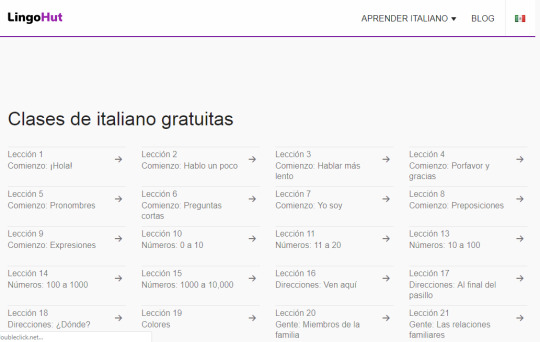
I haven’t checked every lesson yet but for example, the first one is greetings and such. You click that lesson and you have 16 flashcards that will show you the word in your target language and the translation, at the same time that someone pronounces the words.
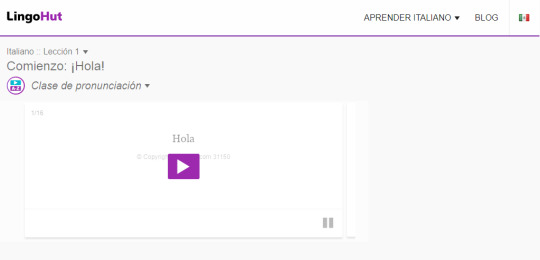
Below the flashcards, you have this ⬇️

And basically is a bunch of game, an easy matching words kind of game, some kind of tic tac toe with words, a memory game do you know the one that kids play in which they have to find the matching pictures? Same but with words and lastly a listening and matching game.
Below the bar of the games, we have the vocabulary list of the words we are taught in that lesson, and you can click the word and listen the pronunciation.
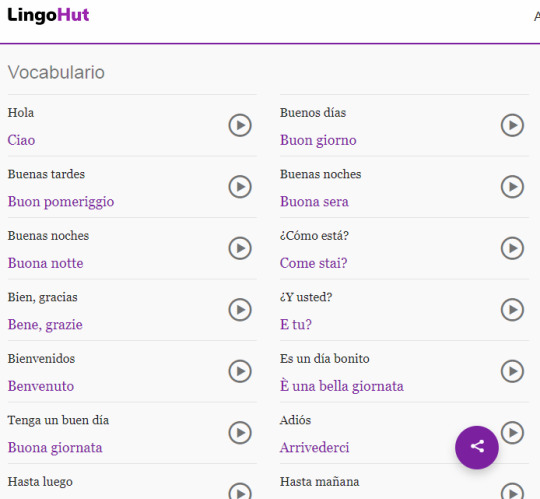
In the end, you have a bunch of the next lessons.
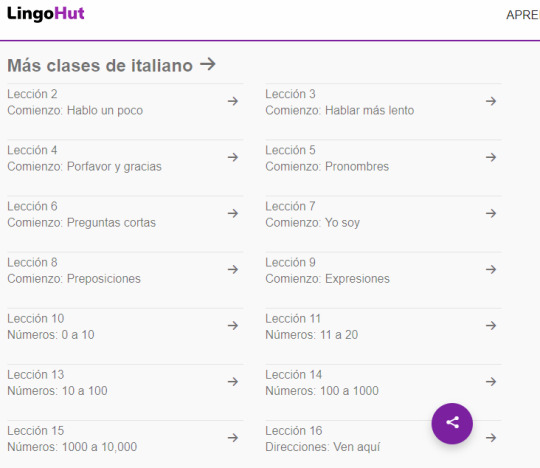
The lessons vary from the content it can be greetings, numbers, health stuff, office words, computer terminology, etc.
The website doesn’t have every language in the world, but it has a lot of them. choose your target language, in my case Italian, and enjoy, is fun and simple if you want to practice or do something related to your target language but you don’t have the willingness that day to study something more consistent like structure.
And the best part is that as far as I went looking around in this page it’s fucking free. Sure, you won’t end the one hundred and something lessons speaking like a native from whatever target language you’re learning, but it can be useful to expand your vocabulary.
11K notes
·
View notes
Text
French short films
The website https://www.myfrenchfilmfestival.com/ just released a few short films that you can watch for free. You can watch more than 50 short films until the 27th of April!
129 notes
·
View notes
Link
Today’s links are for second year phonology, a frequently-requested topic:
1. Phonology with TrevTutor
YouTube video series
16 videos ranging from 6 to 15 minutes. Colorful handwritten slides with voiceover. Content includes basic terminology, detailed discussion of particular features, SPE rules, sonority, and feature geometry. Some videos walk through the process of phonological analysis. Closed captions are auto-generated and struggle sometimes with technical terms, though often the technical terms are displayed on the slides.
2. Phonology Micro-Lectures with The Virtual Linguistics Campus
YouTube video series
33 videos ranging from 1 to 2 minutes. Playlist order appears to be arbitrary. PowerPoint-style slides with voiceover. Some videos present fundamental concepts and phonological processes, while others focus on social/historical variation in phonology. Closed captions are auto-generated and struggle sometimes with technical terms.
3. Introduction to Optimality Theory with Nicholas Rolle
YouTube lecture
51 minute video-recorded lecture from UC Berkeley phonology course. Provides an introduction to the basic concepts and mechanics of Optimality Theory. Presentation is directed toward students in the classroom, though easy to follow as a viewer. While students’ questions can be difficult to hear, the recording is generally high-quality. Closed captions are auto-generated and struggle sometimes with technical terms.
Read the whole thing and sign up to get these newsletters in your inbox on Mondays, Wednesdays, and Fridays.
216 notes
·
View notes
Photo

Aualização feita em 08/02/2020. Para ter acesso ao masterpost clique aqui
23 notes
·
View notes
Text
How to insult your Best Friend by text in French 🇫🇷
Okay so obviously guys these words are just the ways me and my best friend insult each other, it’s not how all friendships insult each other but let’s say that I believe that the stronger the insult the stronger the friendship so HERE YOU GO
Sale/Ptite Pute
This means “dirty/little bitch”, ptite is “petite” but written the way we would pronounce it in fluent French


Convo 1: Play scrabble dirty bitch
Convo 2: Don’t play with my heart little bitch
Tchoin
A bitch also, once again and I have no clue where that comes from tbh
Convo: no you bitch

Salope
Aaaand that’s just another way to say “bitch” lol
Convo: No you’re not allowed it’s a bee bitch

532 notes
·
View notes
Link
If anyone here remembers Lang-8, a place where you could get your writing corrected by native speakers but no longer accepts new people, there is a new site that does something very similar to it. I definitely recommend trying it out.
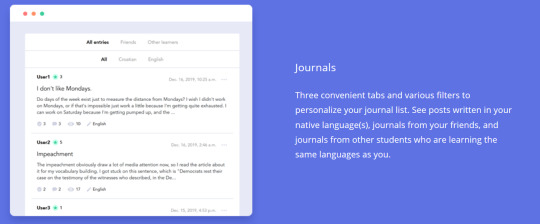
238 notes
·
View notes
Photo
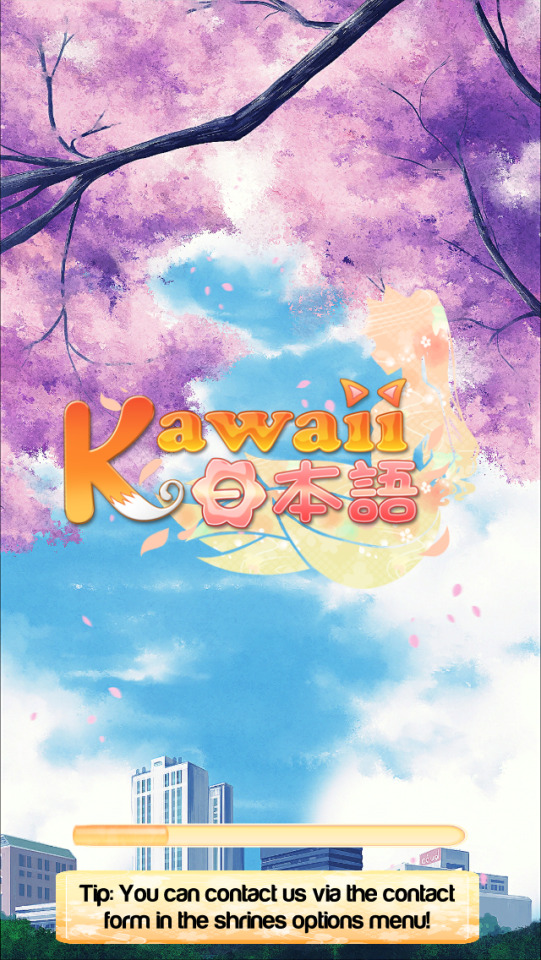



Okay so, another app I wanna ask people about! It’s called Kawaii and is a Japanese learning app.
As far as I saw, it does so by a story in which you are a transfer student and you meet two people who will help you.
The classroom is for Japanese lessons, in the arcade you can play games for vocabulary etc. and you can collect stamps for achievements.
The lessons for Hiragana & Katakana seem to be free, however, Kanji etc. you have to unlock by purchasing “books” for your lessons, but it seems you can get necessary coins by watching videos too?
Anyway, I think the story approach is cute even tho I haven’t seen much yet. I will try do go through Hiragana & Katakana and see if finished lessons unlock anything and how the story progresses! It seems to have something to do with a fox…
If you have any experience with this app, feel free to share!
289 notes
·
View notes
Text
Free Beginners Language Courses
LanguagePod101 have made their Absolute Beginners course free for 3 months in their 34 languages offered.
Afrikaans
Arabic
Bulgarian
Cantonese
Chinese
Czech
Danish
Dutch
English
Filipino
Finnish
French
German
Greek
Hebrew
Hindi
Hungarian
Indonesian
Italian
Japanese
Korean
Norwegian
Persian
Polish
Portuguese
Romanian
Russian
Spanish
Swahili
Swedish
Thai
Turkish
Urdu
Vietnamese
208 notes
·
View notes
Text
How to learn a language when you don’t know where to start:
General Plan:
Weeks 1 and 2:
Purpose:
Learn the fundamentals sentence construction
Learn how to spell and count
Start building a phrase stockpile with basic greetings
The Alphabet
Numbers 1 - 100
Subject Pronouns
Common Greetings
Conjugate the Two Most Important Verbs: to be and to have
Basic Definite and Indefinite Articles
Weeks 3 and 4:
Purpose:
Learn essential vocabulary for the day-to-day
Start conjugating regular verbs
Days of the Week and Months of the Year
How to tell the time
How to talk about the weather
Family Vocabulary
Present Tense Conjugations Verbs
Weeks 5 and 6:
Purpose:
Warm up with the last of the day-to-day vocabulary
Add more complex types of sentences to your grammar
Colours
House vocabulary
How to ask questions
Present Tense Conjugations Verbs
Forming negatives
Weeks 7 and 8:
Purpose:
Learn how to navigate basic situations in a region of your target language country
Finish memorising regular conjugation rules
Food Vocabulary and Ordering at Restaurants
Money and Shopping Phrases
Present Tense Conjugations Verbs
Weeks 9 and 10:
Purpose:
Start constructing descriptive and more complex sentences
Adjectives
Reflective verbs
Places vocabulary
Weeks 11 and 12:
Purpose:
Add more complex descriptions to your sentences with adverbs
Wrap up vocabulary essentials
Adverbs
Parts of the body and medical vocabulary
Tips for Learning a Foreign Language:
Learning Vocabulary:
What vocabulary should I be learning?
There are hundreds of thousands of words in every language, and the large majority of them won’t be immediately relevant to you when you’re starting out.Typically, the most frequent 3000 words make up 90% of the language that a native speaker uses on any given day. Instead try to learn the most useful words in a language, and then expand outwards from there according to your needs and interests.
Choose the words you want/need to learn.
Relate them to what you already know.
Review them until they’ve reached your long-term memory.
Record them so learning is never lost.
Use them in meaningful human conversation and communication.
How should I record the vocabulary?
Learners need to see and/or hear a new word of phrase 6 to 17 times before they really know a piece of vocabulary.
Keep a careful record of new vocabulary.
Record the vocabulary in a way that is helpful to you and will ensure that you will practice the vocabulary, e.g. flashcards.
Vocabulary should be organised so that words are easier to find, e.g. alphabetically or according to topic.
Ideally when noting vocabulary you should write down not only the meaning, but the grammatical class, and example in a sentence, and where needed information about structure.
How should I practice using the vocabulary?
Look, Say, Cover, Write and Check - Use this method for learning and remembering vocabulary. This method is really good for learning spellings.
Make flashcards. Write the vocabulary on the front with the definition and examples on the back.
Draw mind maps or make visual representations of the new vocabulary groups.
Stick labels or post it notes on corresponding objects, e.g when learning kitchen vocabulary you could label items in your house.
How often should I be practising vocabulary?
A valuable technique is ‘the principle of expanding rehearsal’. This means reviewing vocabulary shortly after first learning them then at increasingly longer intervals.
Ideally, words should be reviewed:
5-10 minutes later
24 hours later
One week later
1-2 months later
6 months later
Knowing a vocabulary item well enough to use it productively means knowing:
Its written and spoken forms (spelling and pronunciation).
Its grammatical category and other grammatical information
Related words and word families, e.g. adjective, adverb, verb, noun.
Common collocations (Words that often come before or after it).
Receptive Skills: Listening and Reading
Reading is probably one of the most effective ways of building vocabulary knowledge.
Listening is also important because it occupies a big chunk of the time we spend communicating.
Tips for reading in a foreign language:
Start basic and small. Children’s books are great practice for beginners. Don’t try to dive into a novel or newspaper too early, since it can be discouraging and time consuming if you have to look up every other word.
Read things you’ve already read in your native language. The fact that you at least know the gist of the story will help you to pick up context clues, learn new vocabulary and grammatical constructions.
Read books with their accompanying audio books. Reading a book while listening to the accompanying audio will improve your “ear training”. It will also help you to learn the pronunciation of words.
Tips for listening in a foreign language:
Watch films in your target language.
Read a book while also listening along to the audio book version.
Listen to the radio in your target language.
Watch videos online in your target language.
Activities to do to show that you’ve understood what you’ve been listening to:
Try drawing a picture of what was said.
Ask yourself some questions about it and try to answer them.
Provide a summary of what was said.
Suggest what might come next in the “story.”
Translate what was said into another language.
“Talk back” to the speaker to engage in imaginary conversation.
Productive Skills: Speaking and Writing
Tips for speaking in a foreign language:
If you can, try to speak the language every day either out loud to yourself or chat to another native speaker whether it is a colleague, a friend, a tutor or a language exchange partner.
Write a list of topics and think about what you could say about each one. First you could write out your thoughts and then read them out loud. Look up the words you don’t know. You could also come up with questions at the end to ask someone else.
A really good way to improve your own speaking is to listen to how native speakers talk and imitate their accent, their rhythm of speech and tone of voice. Watch how their lips move and pay attention to the stressed sounds. You could watch interviews on YouTube or online news websites and pause every so often to copy what you have just heard. You could even sing along to songs sung in the target language.
Walk around the house and describe what you say. Say what you like or dislike about the room or the furniture or the decor. Talk about what you want to change.This gets you to practise every day vocabulary.
Tips for writing in a foreign language:
Practice writing in your target language. Keep it simple to start with. Beginner vocabulary and grammar concepts are generally very descriptive and concrete.
Practice writing by hand. Here are some things you can write out by hand:
Diary entries
Shopping lists
Reminders
What could I write about?
Write about your day, an interesting event, how you’re feeling, or what you’re thinking.
Make up a conversation between two people.
Write a letter to a friend, yourself, or a celebrity. You don’t need to send it; just writing it will be helpful.
Translate a text you’ve written in your native language into your foreign language.
Write a review or a book you’ve recently read or a film you’ve recently watched.
Write Facebook statuses, Tweets or Tumblr posts (whether you post them or not will be up to you).
Write a short story or poem.
Writing is one of the hardest things to do well as a non-native speaker of a language, because there’s no room to hide.
There are lots of ways to improve your writing ability, but they can be essentially boiled down to three key components:
Read a lot
Write a lot
Get your writing corrected
28K notes
·
View notes
